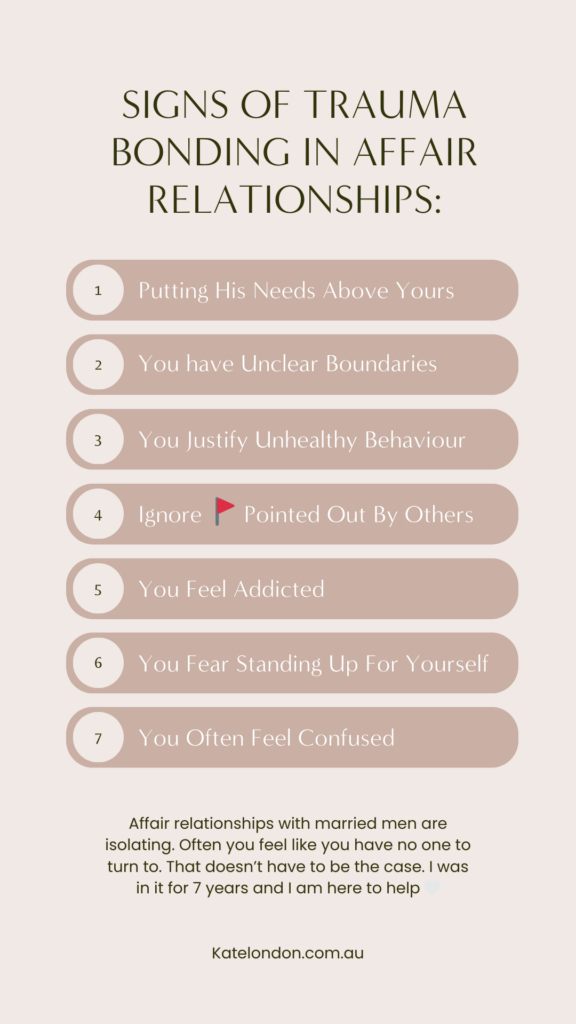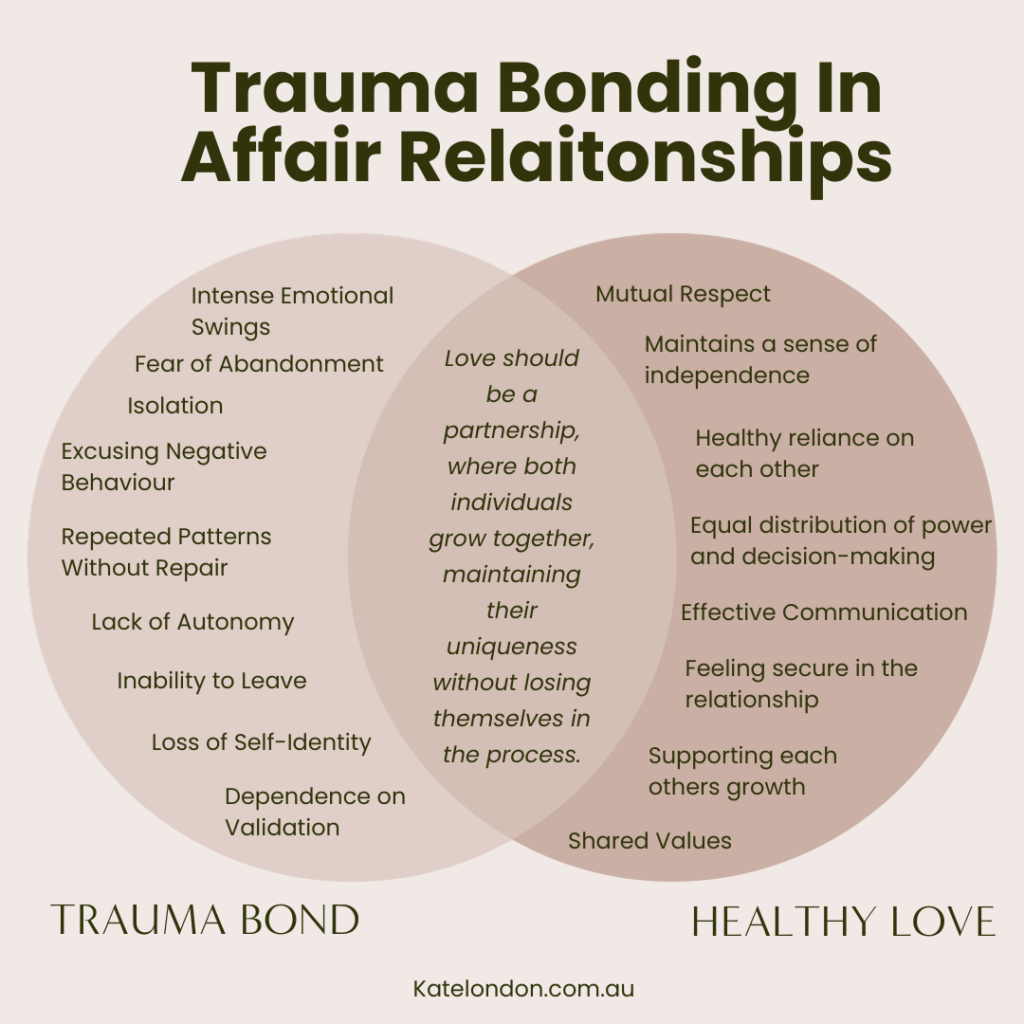7 Signs of Trauma Bonding in Affairs
Do you know the signs of trauma bonding in affairs? Affair relationships can take you on a rollercoaster ride of emotions, but if you’ve found yourself in a repeated cycle of intense intimacy followed by an unbearable emptiness, it may be worth looking into what’s really happening inside your relationship.
Trauma bonding in affairs is extremely common, and it could be the missing link that explains the depths of your pain. In this post you’ll discover 7 signs of trauma bonding in affairs, and what the healthy, balanced relationship you deserve should look like.
Or, if you’re ready to embrace support from someone who understands what you’re going through, book a free discovery call and let’s find out how I can best help you. I get what you’re going through—I was the other woman for seven years—so your story is always held with the utmost compassion with me.
What are the Signs of Trauma Bonding in an Affair?
According to How To Tell If You’re In a Trauma Bonding Relationship, licensed psychologist Liz Powell describes trauma bonding as: “a relationship reflective of an attachment created by repeated physical or emotional trauma with intermittent positive reinforcement.”
Affair relationships are full of intermittent highs and lows.
You get his love, then he goes back to his wife and family.
You say, “NO MORE! I can no longer take this pain”, and he begins to show up in beautiful ways you have not yet seen. The depth of your intimate experiences just seems to get more and more connected in ways you have never experienced before.
He knows you and your body more than anyone ever has…and then you see him and his wife walk hand in hand as a couple at an event and you are left on the sideline, pretending like you are just acquaintances.
The depth of the pain is like no other.
So, in an affair, trauma bonding can look like submitting to your affair partner in hopes of:
- earning his love and approval
- being held with a higher importance in his eyes
- avoiding hurt
- avoiding conflict
Essentially, with a trauma bond, you put your affair partner’s needs above your own.
“Deep down, I remain emotionally attached to him. I can’t help but sneak around, trying to learn about his well-being, leading to obsessive thoughts. It can get so bad that it makes me physically ill.” – Women’s Words
Trauma bonding has many signs to look out for and affairs and other relationships can be built from many different types of trauma bonds (that we’re going to get into below). And, since a trauma bond creates a very unhealthy dynamic and profoundly affects your mental health and self-esteem, it’s very important to understand and recognize signs that your affair relationship may be built on an unstable foundation of attachment through trauma.
Red Flags Your Affair Relationship has Trauma Bonds
How do you know if you have a trauma bond with your AP? Here are some signs that you’re in this type of relationship dynamic. Keep in mind that every situation, including yours, is unique. Some of these may fit, while others may not.
These signs are simply a guide to help you figure out whether your relationship with a married man is healthy or not.
1. You agree with your affair partner when you want to disagree.
The other woman in an affair relationship will often practise (and prioritise) conflict avoidance. So the question is: Do you often find yourself saying yes when you want to say no?
This could look like something along the lines of having a date planned when your affair partner calls to tell you that he now has plans with his family and can only give you an hour of his time.

Rather than tell him that you aren’t going to give him that hour—because it hurts that he’s breaking plans with you—you accept that hour because it’s all you can get.
What message does your AP get? That he can change or break his commitments to you—put you second—at any time and you’ll be totally fine with it. In other words, you’re letting him know that you’ll settle for the crumbs instead of telling him that you won’t settle for anything less than the loaf.
You give your affair partner all the power by handing all the decisions to them, even when you know what you want. You do this with words like:
“I don’t know.”
“You choose.”
“What do you want?”
You don’t speak up when he treats you poorly or when you feel like you are being treated unfairly. Your internal voice is constantly at odds with your actions (or your heart is telling you one thing and your actions are ignoring what your heart is telling you).
2. Your Affair Partner Constantly Tests Your Boundaries
If you are with someone who is constantly violating your boundaries, on some level you are accepting that experience. Our energy creates our reality, so, on some level, you have sent out an energy that says you don’t enforce your boundaries and your affair partner (who is prone to violating boundaries) has honed in on it and found you.
If you want your affair partner to STOP pushing past your boundaries, it’s essential that you take a look at yourself and ask WHY you are attracting this experience. If it helps, you can start by reflecting on these questions:
- What kind of energy am I sending out to make him believe it’s okay to violate my boundaries?
- How am I the perfect match for this experience? Why am I attracting this into my life?
- If he’s ignoring my boundaries, where am I ignoring my own boundaries?
- Where in my life am I allowing this to happen and how can I stop it?
We can’t figure out WHY we allow certain people and behaviours in our lives if we point the finger at others. We have to look at ourselves and be honest about where we are allowing unwanted behaviours and energies to happen.
How do you know if your affair partner is pushing your boundaries on purpose?
It can be extremely uncomfortable for your affair partner when you begin to set boundaries— especially if your entire relationship has been built on a lack of boundaries. He may take it as you are withdrawing your love or punishing him (even though healthy boundaries are always created with love), and it may result in pushback from him.
This could look like:
- Him ignoring your boundaries and pushing past them. If you grew up in a family where your boundaries were constantly pushed and violated, you may perceive this type of behaviour as love. But it’s not. Healthy love allows for clear boundaries and respects them. If your affair partner is constantly pushing and taking more and more—and if it’s making you feel small and controlled—he isn’t doing it out of love. He is trying to control you.
- He makes you feel bad when you DO set a boundary. This can look like pouting, having a temper tantrum like a child, turning your own boundary back on you in retaliation, and/or withholding his time or affection until you give in.
3. You justify unhealthy behaviour and actions.
In this kind of trauma bond, you support all your affair partner’s unhealthy behaviours and actions without trying to figure out why you are doing that or where you are allowing him to get away with the behaviours.
Justifying his unhealthy behaviours can look like:
- Agreeing with his excuses for not leaving his wife (maybe it’s because his kids are still in school and he can’t leave to spend time with you, or his work is really stressful and it’s just not a good time or any number of other things).
- Putting him above all of your own needs and telling yourself that you’re just being supportive while he navigates some difficult obstacles. It’s really easy to tell ourselves all sorts of stories that explain away unwanted, hurtful behaviours from our partners. But, if you’re getting sucked into his stories, you are bonding through HIS struggles and forgetting to check yourself and ask yourself how all of his stories and struggles are making YOU feel. Are they making you feel loved? Are they lifting you up? Is he also attending to your needs?
- Allowing him to treat you like crap (because maybe he had a bad day or a hard childhood or some other sob story he feeds you to make it seem like it’s okay that he isn’t kind or loving toward you) and telling yourself that, despite the way he treats you, he’s still a good man.
The fact is that a trauma bond built on your acceptance of your affair partner’s stories and unlikely scenarios gives him a million easy excuses and allows him to neglect your needs, mistreat you, or selfishly put himself first always. And that is extremely unhealthy.
If your affair partner truly loves you and wants you to be happy and fulfilled, he will put you first no matter what obstacles are in his way.
I believe that every person has goodness and light in them, but no matter what his stories are, you STILL don’t deserve to be mistreated, neglected, ignored, used, or anything else that you allow him to get away with. You should never lower your worth or potential and stand for mistreatment by anyone. You deserve more than that and, if your affair partner’s behaviour is causing you to create stories to justify his undesirable behaviours, it is most likely time for you to break that trauma bond.
So what stories are you allowing and feeding to justify why your relationship hasn’t been able to move forward or your affair partner hasn’t left his wife yet?
4. You ignore red flags pointed out by others.
When other people point out bad behaviours of your affair partner, how do you react? Do you immediately justify those bad behaviours by making excuses for them? Maybe that sounds something like:
“He had a bad sleep last night.”
“He’s really stressed.”
“He’s not usually like that.”
“I don’t think it was that bad.”
Or maybe you completely leave out his bad behaviours so others don’t know about them at all. Maybe you only share good stories about the fun moments and happy moments you share with your partner.
You don’t tell anyone how you can only show your emotions and cry when you’re alone in the shower, or how he constantly cancels plans with you at the last minute to spend time with his wife, or how he belittles you and constantly makes comments about how you’re not good enough.
Making excuses for bad behaviours or omitting them altogether are BOTH signs of a trauma bonded relationship. Another big reason to evaluate whether or not you should be staying in this unhealthy affair relationship.
5. You feel addicted to your affair partner.
This particular trauma bond holds enormous and deep power over people because many mistake it for chemistry. It’s controlled not only by our mental state but also by our physical state. The highs and lows of a trauma bond (the drama, the intense love affair, the roller coaster of highs and lows) are mirrored by both adrenaline and cortisol levels, so it keeps people in a constant fight-or-flight state.
The highs are intense and leave us feeling almost drugged and the lows are gut-wrenchingly painful and leave us yearning for another hit of the highs.
The addiction trauma bond can look like this:
- Constantly check your phone for messages from your lover or to see what they’re up to.
- Fearing that your partner is cheating on you.
- Stalking his wife’s social channels to see what she’s doing (and feeling gutted if she’s out with him and their children).
- Stressing if he doesn’t call when he says he will or if he doesn’t do something he says he will.
Addiction is not healthy love. It’s not healthy to obsess about anyone or anything. A healthy relationship allows for two people to be apart and be totally okay with it. You and your partner should be able to do your own thing and not feel stressed about it.
It’s not healthy to live in a relationship that jumps from high to low all the time and leaves you feeling either euphoric or severely depressed with no in-between. Even worse than all the others, it depletes your physical health too because living in a state of chronic stress can have long-term consequences on your health.
“I still haven’t figured out what he provided me that I craved so desperately.” – Women’s Words
6. You fear standing up for yourself or voicing your desires.
When we fear standing up for ourselves in a relationship or we don’t give voice to our desires, it means we don’t feel comfortable enough to fully be ourselves and give expression to our needs, wants, and desires. So we suppress ourselves and—essentially—wear a mask where we pretend to be someone we are not in order to make our affair partner happy.
Fear of voicing our desires can look like this:
- not speaking our truth because we don’t want to hurt their feelings.
- not asking for what we want because we don’t want to cause conflict.
- worrying about doing something that will make them angry.
- not leaving or ending your affair relationship because you worry about their reaction (and if they will hurt themselves, have a massive outburst, or something else).
Are you shifting yourself away from who you want to be in order to make your partner happy? Changing yourself to get the response you want out of your affair partner—and to make them happy—is not a healthy bond. A healthy bond allows you the freedom to be who you are, fully, and have a partner who accepts that and respects it.

7. You often feel confused.
Confusion is HUGE in trauma bonding because you lose a huge part of yourself in trying to conform and change to create the illusion of a happy relationship. You lose your free will, in a way, because you are constantly tailoring your words, choices, and actions to agree with what they want. And this can show up as feeling confused all the time because your actions and words are pointing in one direction while your intuition and heart are telling you to do or say something else.
Is Trauma Bonding a Form of Abuse?
Trauma bonding is often looked at as abuse, but the reality is trauma bonding can happen to anyone; it’s simply building an attachment through the need to avoid pain. Trauma bonding also doesn’t have to define the whole relationship. You can have elements of your connection that are bonds built through trauma.
A trauma bond affair relationship can feel very magnetic and highly charged, but as high as you may feel—because there can be beautiful highs in your affair relationship—there can be equally low feelings as well. Trauma-bonded relationships have a very obvious push-pull dynamic at play.
Often, women in affair relationships experience a lot of pain—constantly feeling unsure where the affair is going or what to do. Whether you want to leave or you want your affair partner to leave his wife for you, attaching through trauma bonds in the relationship adds a layer of difficulty.
Trauma bonding builds all sorts of unhealthy dynamics in relationships and can make it really hard to see things objectively. The strength of your trauma-bonded connection is built from fear/survival mode instead of unconditional love and freedom.
For example, when a healthy relationship goes through a breakup, two people can easily come to the conclusion that their relationship is no longer working for them and they can choose to part ways amicably. They can still love each other and feel supported by each other, even when the relationship ends and they move on.
With trauma bonds, you can feel like you are losing a big part of yourself when you step away from the relationship. You can feel like a big part of you cannot be whole without your partner.
Let’s dig deeper into the difference between a healthy and unhealthy relationship.
Healthy vs Unhealthy Relationships
Although there can be some debate among experts about the top criteria for healthy and unhealthy relationships, most agree on these:

There are some clear signs of trauma bonding in relationships. Here are some ways you might be able to identify an unhealthy, trauma bonded relationship.
1) You sacrifice your own needs to meet the needs of your affair partner.
Do you put aside your own needs—all the things that are significant and meaningful to you—to ensure your affair partner’s needs are being met?
2) You have unclear boundaries.
When we don’t set clear boundaries, we become out of balance within ourselves and this can also cause our relationship balance to shift and become lopsided. To create a balanced relationship, we have to first dig deep into ourselves to figure out what we are willing to allow or not allow and then we have to speak up and make those boundaries clear (both for ourselves and our affair partner).
Why are Boundaries Important in an Affair Relationship?
Let’s say you’ve made it clear that you want your affair partner to leave his wife so the two of you can be exclusive. Now, if he’s constantly telling you that he will leave his wife (but making excuses NOT to) and you continue to hang around, waiting for him to do it, you are showing him that you are still willing to continue with the way things currently are in the affair relationship.

Communicating a clear boundary might look like this:
“I am no longer willing to participate in an affair dynamic. In order for me to entertain a relationship with you, I need exclusivity. If that is something you would like to be a part of, then I would love you to be my partner on that journey.
But until you are single and can devote yourself fully, in a transparent and authentic way, I am no longer going to participate in a romantic and emotional connection with you.”
By not following through with any consequences for crossing your boundaries, you are allowing the excuses and stalling to continue. Your words may be clear, but your actions are communicating otherwise.
Tips for creating—and stating—your boundaries.
Clarity is essential when you’re communicating your boundaries. If you are not clear on your boundaries then the probability of your boundaries being crossed is extremely high because how can either you or your affair partner respect and follow through with a boundary if the line isn’t clearly drawn out in the first place?
Examples of what your boundaries could look like:
“I’m no longer going to see you alone, in person, unless you are single.”
If your AP is a co-worker: “From now on, I am only going to communicate with you via the work email on work subjects.”
“I am no longer going to participate in a texting/phone call type friendship with you.”
“I am choosing to cut all contact with you for three months. If I want to reach out after that I will do so.”
If those boundaries feel far too big to act on and you can’t see yourself following through, start small. Learning how to set small boundaries will help you feel comfortable setting bigger boundaries in the future.
Examples of what small boundaries can look like:
“Texting me when you’re at home with your wife makes me feel uncomfortable. If you want to communicate, call me when you are alone.”
“30-minute rushed car sex does not fullfill me. If you want to see me, I need at least two hours of your time when both of us don’t feel rushed or at risk of being caught.”
“I don’t feel comfortable working on this project together as I fear being caught. Please find someone else to fill my role on this job or I will need to step down.”
It is essential to set clear boundaries in a trauma bonding relationship. Why?
If you make half-assed boundaries and your affair partner continues to not give you what you’ve asked for, then the frustration and stress (and heartache) that comes from that is being caused by your lack of clarity. Essentially, if your boundaries are blurred, you’re most likely enabling your affair partner’s behaviour and, with trauma bonding, it is SO easy to violate our own boundaries in order to satisfy the needs of your partner in a misplaced effort to win his love.
Once you have set clear boundaries, you must then show up and follow through with them.
Why is it hard to set boundaries in a relationship that is based on a trauma bond?
With a relationship that is built around a trauma bond, it can be really difficult to set boundaries and stick to them—even when we desperately need to follow through for our mental well-being—because we fear that we will lose our affair partner’s love or we’ll create conflict if we set boundaries.
So many people just continue to allow unfair and unwanted behaviours from their partners just to avoid those two possible outcomes.
It’s Time to Break Trauma Bonds and Create a Healthy, Balanced Relationship
Once you recognize the signs of trauma bonding, they can be hard to unsee—especially if you’ve realised you’re in a trauma bonded relationship with a married man. It is often easier for people to deny what is going on rather than admit to themselves how unhealthy the relationship is.
It can be even harder to admit to these signs in an affair relationship because it is surrounded by so much secrecy and shame and guilt, so the trauma bonds can actually be even deeper than usual. And, because you’re not out in public showing your relationship and you’re not talking about your affair with your friends, family, or coworkers, so it can be harder for people to actually point out red flags or bring concerns to your attention.
The first step is to seek out someone to talk to about your trauma-bonded relationship. You’d be surprised at how easy it becomes to recognize unhealthy trauma bonds once you have a conversation with someone about your affair or other relationship.
If you need help working through trauma bonds or breaking free of them, I would love to hear from you. By booking a free discovery call, we can shed some light on how you can navigate through these difficulties.
Are you interested in connecting with other ladies who have also been the other woman in affair relationships? Ask about my free and completely private online support group for women in affairs on our call and I’ll give you the details.
For more information on healthy versus unhealthy affair relationships, read these:






